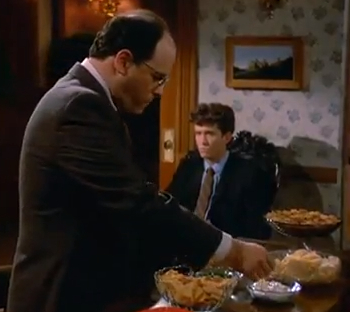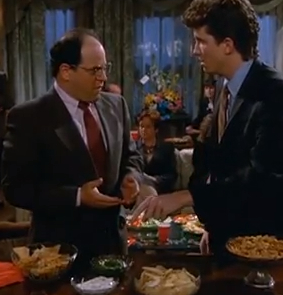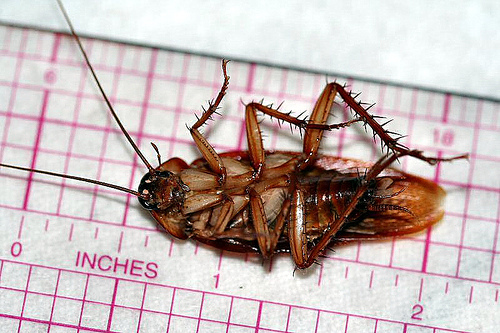A 1993 episode of the television show, Seinfeld, landed the term double-dipping into popular culture when George Costanza is confronted at a funeral reception by Timmy, his girlfriend’s brother, after dipping the same chip twice.
“Did, did you just double dip that chip?” Timmy asks incredulously, later objecting, “That’s like putting your whole mouth right in the dip!” Finally George retorts, “You dip the way you want to dip, I’ll dip the way I want to  dip,” and aims another used chip at the bowl. Timmy tries to take it away, and the scene ends as they wrestle for it.
dip,” and aims another used chip at the bowl. Timmy tries to take it away, and the scene ends as they wrestle for it.
Peter Mehlman, a veteran “Seinfeld” writer, wrote the episode, and said,
"At the time I was living in Los Angeles, in Venice. There was a party on one of the canals, and apparently someone dipped twice with the same chip. And a woman flipped out. ‘You just dipped twice! How could you do that? Now all your germs are in there!’ I thought, this is just too good not to use on the show.”
CNNGo.com asks this morning, “would you think twice about diving — chopsticks first — twice back into the communal service dishes on just about every table in Shanghai?
“… in China we all ‘double dip.’ If you say you don’t, you’ve never been to a good Chinese meal in Shanghai.
“In restaurants when we share plates of food, almost everyone takes more than a bite with their own personal chopsticks from the shared plates. That means our saliva-covered chopsticks are carrying germs back and forth all meal-long, making for one big shared germ fest on all the plates.
“However, few people, Chinese or Western, seem to view double dipped chopsticks in the same dubious light as a double-dipped chip.”
Lisa Wu, a student at Shanghai International Studies University, said,
“When I was young, my parents would only mention this issue when they caught a cold. They’d keep a separate bowl and use a pair of new chopsticks to pick out some food for themselves. But the rest of the time, we never really thought twice about sharing.”
Wu says that right after the SARS epidemic, there was a public debate on whether people should adapt Western ways of eating, with separate individual servings or at least the use of “public chopsticks” or gongkuai.
Public chopsticks are chopsticks provided for general serving, like a serving spoon, and not used for eating. However, Wu says when the SARS crisis  petered out, so did the chopstick discussion.
petered out, so did the chopstick discussion.
Huang Juemin, a pediatrician at Shanghai United Family Hospital, said,
“As a teenager growing up in Shanghai in late 1980s I remember vividly the Hepatitis A outbreak. For a while, people challenged the custom of ‘double dipping’ and started using gongkuai — public chopsticks.”
After discussing the double dipping issue with her internal medicine colleagues, Dr. Huang says they all believed that “definitely there is an increased risk for H. Pylori and Hepatitis A, if not Hepatitis B infections. … I think we should make an effort to use public chopsticks from the public health standpoint.”
 The family business in Minto, NSW, has reassured the community the rat’s appearance was a freak incident after a resident’s video was shared hundreds of times in the space of hours, reported the Macarthur Chronicle.
The family business in Minto, NSW, has reassured the community the rat’s appearance was a freak incident after a resident’s video was shared hundreds of times in the space of hours, reported the Macarthur Chronicle.




 in a bowl of ginger and chilli mix, and high levels of E. coli and other bacteria in a bowl of rice.
in a bowl of ginger and chilli mix, and high levels of E. coli and other bacteria in a bowl of rice.(1).png) Italian/pizzerias 83, Japanese 66 and Vietnamese, 24. Modern Australian, Korean, Lebanese, American, Turkish and Pakistani restaurants rounded out the state’s 12 most culpable cuisines.
Italian/pizzerias 83, Japanese 66 and Vietnamese, 24. Modern Australian, Korean, Lebanese, American, Turkish and Pakistani restaurants rounded out the state’s 12 most culpable cuisines.(1).jpg)
.jpg) Largo Drive to tell those "idiots" that they shouldn’t have gotten your order wrong does not an emergency make.
Largo Drive to tell those "idiots" that they shouldn’t have gotten your order wrong does not an emergency make. dip,” and aims another used chip at the bowl. Timmy tries to take it away, and the scene ends as they wrestle for it.
dip,” and aims another used chip at the bowl. Timmy tries to take it away, and the scene ends as they wrestle for it. petered out, so did the chopstick discussion.
petered out, so did the chopstick discussion. surfaces and utensils at the premises.
surfaces and utensils at the premises. their hands as often as necessary or sanitising surfaces to protect food safety and food being left open in containers with no – or ill fitting – lids
their hands as often as necessary or sanitising surfaces to protect food safety and food being left open in containers with no – or ill fitting – lids A national survey of hygiene ratings found that more than half of 491 Chinese outlets failed to meet all legal requirements aimed at preventing food poisoning among diners. Almost half of Indian restaurants and takeaways surveyed also scored poorly in the survey of different cuisines, which was carried out for
A national survey of hygiene ratings found that more than half of 491 Chinese outlets failed to meet all legal requirements aimed at preventing food poisoning among diners. Almost half of Indian restaurants and takeaways surveyed also scored poorly in the survey of different cuisines, which was carried out for